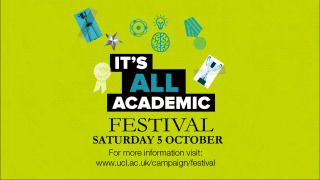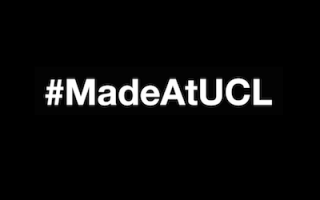#MadeAtUCL Marquee
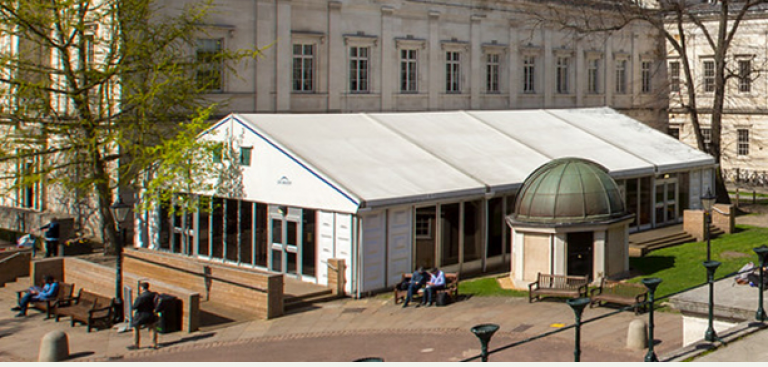 Marquee Talks
Marquee Talks

All talks were open to all and will soon be made available as podcasts. Watch this space.
- 10am: Revealing Brain Activity with Neuropixel Probes
- Speaker: Matteo Carandini, Institute of Ophthalmology / Brain Sciences, UCL
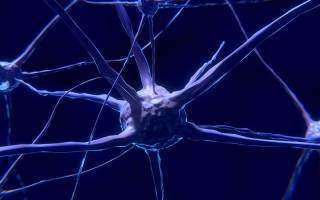
Talk description: Matteo Carandini explains the how “Neuropixels probes”, developed at UCL, allow researchers to record from thousands of neurons simultaneously throughout the brain and how these new probes are changing the way we think about brain function. - 10.20am: Apps and games for Maths and English primary pupils #MadeAtUCL Knowledge Lab
Speaker: Manolis Mavrikis, Institute of Education, UCL
Talk description: This talk will present example apps and games from research projects at UCL Knowledge Lab for primary pupils' mathematics and reading. By drawing attention to the opportunities that new technologies offer, the talk will also give pointers to how parents and educators can choose good quality apps based on sound research and evidence.- 10.40am: Are public services better when the public design them? Learnings from Lebanon
- Speaker: Dr Ala'a Shehabi, Institute for Global Prosperity, UCL
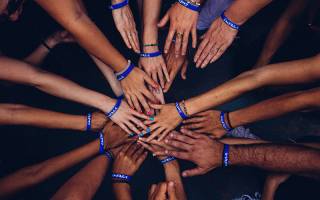
Talk description: This talk will explore the approaches and methodologies used in the RELIEF Centre to engage with publics in Lebanon in co-designing public services. Using examples from research, Dr Ala'a Shehabi will present their citizen engagement work and the interventions it has enabled in this space. - 11am: A touch of prosthetic devices
- Speaker: Helge Wurdemann, Mechanical Engineering, UCL
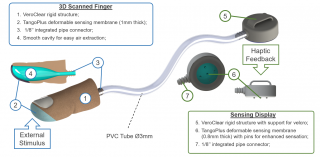
Talk description: This talk will give an overview of the journey from the idea of a purely mechanical haptic feedback system to developing actual prototypes of prosthetic hands with haptic feedback for amputees. The team have received support from UCL Grand Challenges and the Royal Academy of Engineering and worked with international communities and with colleagues in low- and middle-income countries - an inspiring and exciting talk! - 11.30am: Design for Learning - as easy as ABC!
- Speaker: Clive Young, Information Services Division, UCL
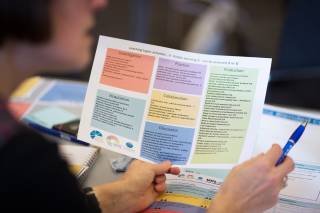
Talk description: This talk will explore UCL's fast, fun and effective way to design courses with learners in mind. The UCL Digital Education Advisory team has developed an effective and engaging hands-on workshop called ABC, which uses a game-style format and is particularly useful for developing new programmes or for those changing to an online or more blended format. - 12noon: Comet Interceptor
- Speaker: Geraint Jones, Mullard Space Science Laboratory, UCL

Talk description: Comet Interceptor - a mission led by UCL's Mullard Space Science Laboratory - was recently selected by the European Space Agency as a new mission to be launched in 2028. The mission's aims are to visit a comet that is approaching the Sun for the first time since the solar system's formation, giving us important clues to the origin of Earth and the other planets. In this talk, the Geraint Jones will describe the scientific aims and planned observations of this ground-breaking €150M international project, and the scientific instruments that we plan to build for the spacecraft. - 12.30pm: Therapy apps for patients with acute brain injury or dementia
- Speaker: Alexander Leff, Professor of Cognitive Neurology, UCL
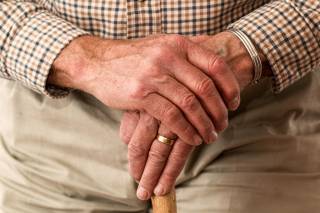
Talk description: This talk will explore the UCL Institute of Neurology's approach to co-design and show some results from our therapy apps. - 1pm: Learning about English grammar with Englicious
- Speaker: Bas Aarts, Department of English Language and Literature, UCL

Talk description: The talk will present the Englicious project whose aim is to make the teaching of English grammar in schools easier with the online resources offered by the Englicious, an entirely free online library of original English language teaching resources. - 1.30pm: Artificial Intelligence for Art Investigation
Speaker: Miguel Raul Dias Rodrigues, Department of Electronic and Electrical Engineering, UCL
Talk description: The cultural heritage sector is experiencing a digital revolution driven by the growing adoption of non-invasive, non-destructive imaging and analytical approaches generating multi-dimensional data from entire artworks. This talk will explore how recent advances in artificial intelligence technologies are advancing the field of art investigation, conservation, and presentation.- 2pm: “Look Mum no hands!”
- Speaker: Tom Cohen, Dept of Civil, Environmental & Geomatic Engineering, UCL
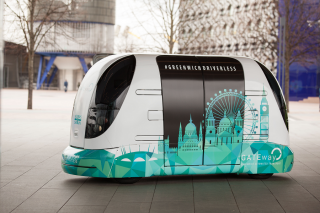
Talk description: What can we expect when road vehicles start to drive themselves? - 2.30pm: The Women We See: Gender, Diversity and Advertising in London
- Speaker: Jessica Ringrose, Institute of Education, UCL
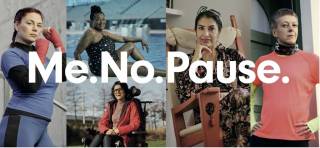
Talk description: Following public outcry over a body shaming advertisement in the London transport network, the Mayor of London commissioned a multimedia documentary-style study that involved 16 commuting interviews with women throughout London, two “talk back” art projects with school girls, and a survey of 2000 Londoners. The research culminated in the Report: The Women We See, Women and Girls Experiences of Gender and Diversity in Advertising. The talk discusses the process of engaging in feminist public change with a range of industry and government stakeholders to challenge and transform invisibilities and exclusions in public advertising. - 3pm: Original Research By Young Twinkle Students (ORBYTS): When can students start performing original research?
Speaker: Jonathan Tennyson, Massey Professor of Physics, UCL
Talk description: This talk will explore the work performed by school students who have been helping to prepare for the Twinkle Space mission which will characterise nearby exoplanets (that is planets orbiting other stars).- 3.30pm: Map-making by City-makers
- Speakers: Adriana Allen and Rita Lambert, The Bartlett Development Planning Unit, UCL
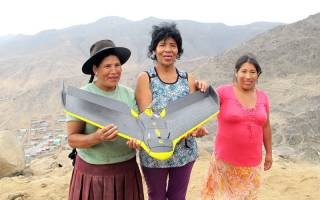
Talk description: This interactive session draws from two action-research projects, ReMap Lima and cLIMA sin Riesgo. It explains how invisibilised processes that put local communities at risk can become visible and tackled through a combination of mapping methods applied from the sky and the ground. The session zooms into how this was done and with what consequences in the context of Metropolitan Lima, where the use of drones and community-led mapping allowed impoverished local communities to make visible how, where and why they live in precarious and hazardous conditions.
Marquee exhibition stands
The exhibition stands showcased a selection of the most exciting research taking place at UCL. Attendees had the chance to see a life-sized model of the Rosalind Franklin rover that will be sent to Mars in 2020, learn to speak Mandarin and manipulate a prototype of a prosthetic hand, amongst others.
- Degrees and careers in science, technology, engineering and maths
- Exhibitor: Rebecca Mckelvey, Founder and CEO of In2scienceUK
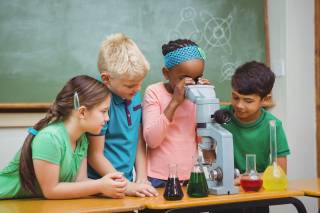
Stand description: Find out about different degrees and careers in science, technology, engineering and maths. - The RELIEF Centre Roll of Research
- Exhibitor: Annelise Andersen, Institute for Global Prosperity, Bartlett, UCL

Stand description: Did you know that we work with entrepreneurs in Lebanon who are making surfboards out of used cigarettes? Or that we curate music events with Lebanese musicians to understand how sound affects space? The RELIEF Centre Roll of Research invites you to get to know our work better. Spin the wheel, and find out about what we do, what we have found, who we work with, where we work and more. From helping Syrian teachers improve their skills through online technology to conducting the biggest ever household survey in Hamra, Beirut with UN Habitat, and many things in between – come and talk to the researchers behind The RELIEF Centre and discover something new about life in Lebanon. - Map-Making by City-makers
- Exhibitors: Adriana Allen, Rita Lambert and Julia Wesely, The Bartlett Development Planning Unit, UCL

Stand description: The exhibition stand displays maps, videos and panels that invite a reflection on how local women and men can play an active role in mapping preventable risks that impact negatively their everyday lives and the current and future development of the city. Through the innovative combination of mapping methods in Lima, the world’s second-largest desert city, this experience shows can collective mapping and action can play a crucial role in activating strategies towards urban resilience and justice in Lima and elsewhere. - With science and research, we beat diseases
- Exhibitor: Dr.Yara Hassan, Institute of Neurology, UCL
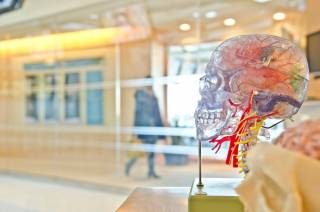
Stand description: Huntington's disease has a broad impact on a person's functional abilities and usually results in movement, thinking (cognitive) and psychiatric disorders. Find out about some of the functional and cognitive disabilities caused by Huntington's disease through interactive games, assessment tools, and brain and spine models. - UCL at the Final Frontier
- Exhibitor: Chris Owen, Dept of Space & Climate Physics, UCL

Stand description: This stand will show results of Solar System and astrophysics research, scale models of hardware for engagement in space engineering and a life-sized model of the Rosalind Franklin rover that will be sent to Mars in 2020, which carries onboard a stereo camera system developed at UCL Mullard Space Science Laboratory (MSSL). Visitors will be able to talk with our scientists about research at the cutting edge of space science, our hardware, watch videos and animations and take away handouts for further learning. - Learn to speak Mandarin
- Exhibitor: Greg Walker, Institute of Education, UCL
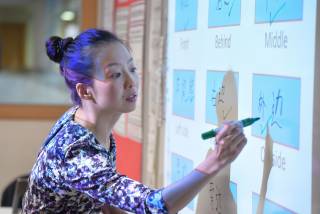
Stand description: With over 1.5 billion speakers, Mandarin Chinese is officially the most widely spoken language on Earth and since 2006 the UCL IOE Confucius Institute (IOE CI) has been leading the way in teaching it to thousands of school pupils around the country, including enabling more than 5,000 students to travel to China for a life changing summer of study. Visit the stand to find out more about how the IOE supports schools, about their extensive teacher training programmes, the success of the Mandarin Excellence Programme and to learn to say a few things in Chinese. It’s easier than you think! - Gender, Diversity & Advertising: Craft Back Collaging
- Exhibitor: Jessica Ringrose, Institute of Education, UCL

Stand description: This stand will display the collaging artefacts from my gender and advertising research project for the Mayor of London; It can also feature materials for audience members to participate in collaging craft back to challenge gender norms in advertising themselves. - Haptic feedback for prosthetic hands
- Exhibitor: Helge Wurdemann, Mechanical Engineering, UCL

Stand description: Come along to the stand and experience wearing a prosthetic hand and haptic feedback! The prototype is a 3D printed body-powered prosthetic hand. The fingertips are modified in a way to accommodate our mechanical sensor. Visitors can experience how haptic feedback is received when manipulating an object with the prosthetic hand. - Project Malachi
- Exhibitor: Manni Bhatti, Department of Civil, Environmental and Geomatic Engineering, UCL
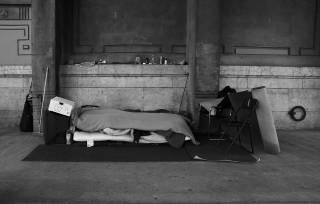
Stand description: Project Malachi is led by The Salvation Army and aims to house rough sleepers in Redbridge, London. The project involves constructing an apartment complex from disused shipping containers, and aims to be modular, inexpensive, and environmentally friendly. Come along to meet the minds behind the project. - Learning about English grammar with Englicious
- Exhibitor: Bas Aarts, Department of English Language and Literature, UCL

Stand description: Come along to the stand to get a demonstration of the Englicious website. Englicious offers free English language resources, especially on grammar, to primary and secondary school teachers at all the key stages to help them to deliver the specifications of the National Curriculum. It contains lesson plans, exercises, CPD materials, videos, games, and much more. - First World War Centenary Battlefield Tours Programme and Legacy Projects
- Exhibitor: Jeff Marks, Programme Coordinator for the Institute of Education’s First World War Centenary Battlefield Tours Programme, UCL
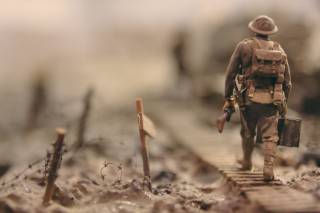
Stand description: Come along and meet the minds that have been running the award-winning First World War Centenary Battlefield Tours Programme. The team has been providing free tours of First World War battlefield sites to every state-funded secondary school in England, since 2014. They also run CPD courses for teachers and following a tour, students are encouraged to complete a community-based legacy project where participating students create an enduring legacy by impacting upon at least 110 people within their local community. To date, this project has reached more than 15 million people. - Synchronising thousands of computers to within trillionths of a second through optical fibre
- Exhibitor: Kari Clark, Optical Networks Group researcher, UCL

Stand description: Poster exhibition with Optical Networks Group researcher, Kari Clark, discussing his research entitled 'Subnanecond Clock and Data Recovery in an Optically-Switched Data Centre Network'. Kari will also be providing some demo examples, including an optical fibre and fibre microscope. - Apps and games for Maths and English primary pupils #MadeAtUCL Knowledge Lab
Exhibitor: Manolis Mavrikis, Institute of Education, UCL
Stand description: This stand will present example apps and games from research projects at UCL Knowledge Lab for primary pupils' mathematics and reading. By drawing attention to the opportunities that new technologies offer, Manolis will also give pointers to how parents and educators can choose good quality apps based on sound research and evidence.- Design for Learning - as easy as ABC!
- Exhibitor: Clive Young, Information Services Division, UCL

Stand description: The UCL Digital Education Advisory team has developed an effective and engaging hands-on workshop called ABC, which uses a game style format and is particularly useful for developing new programmes or for those changing to an online or more blended format. ABC Learning Design was awarded two- year Erasmus + funding in 2018 and has been used in over 80 universities across the world. Come along and see how it works.Read about how the Digital Education Advisory team made developing new programmes as easy as ABC
- Helping researchers and people Join Dementia Research
- Exhibitor: Adam Smith, Institute of Neurology and National Institute for Health Research
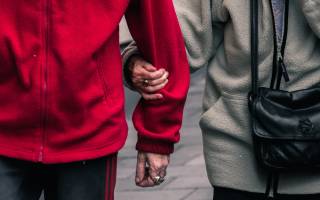
Stand description: Find out about barriers to effective Dementia study recruitment with our giant Ker-Plunk, and how UCL is helping beat dementia through its UK wide, Join Dementia Research Service. Using clever tech, creative algorithms and matching and public engagement. - From Coal Mine Waste to Landscape Painting
- Exhibitor: Onya McCausland, Slade School of Fine Art, UCL

Stand description: Find out more about how Onya turned waste ochre sludge from ex coal mines into pigment for paint. - Revolutionising the use of x-rays 126 years after their discovery
- Exhibitor: Sadro Olivio, Department of Medical Physics & Biomedical Engineering, UCL
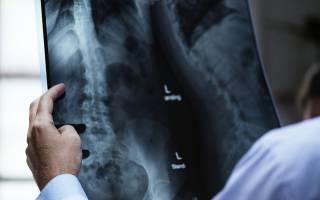
Stand description: Discover how we convert ultra-small x-ray deflections into images of the invisible. Featuring practical demos with laser pointers, invisible balls, and the microfabricated masks that make the science possible. Join us at our stand for a sneak-peak into the future of x-ray imaging technology. - Apps/games to improve language and visual function in patients with acquired brain injury
- Exhibitor: Alexander Leff, Professor of Cognitive Neurology, UCL

Stand decription: UCL minds have developed a series of therapy apps for patients with language disorders due to stroke or dementia, with the help of patients with these disorders. Mass practice has been shown to improve language performance but it takes time, so we have gamified our therapies to maximise engagement. Come and give them a go!Find out more about the apps that help patients with acquired brain injury
 Close
Close


